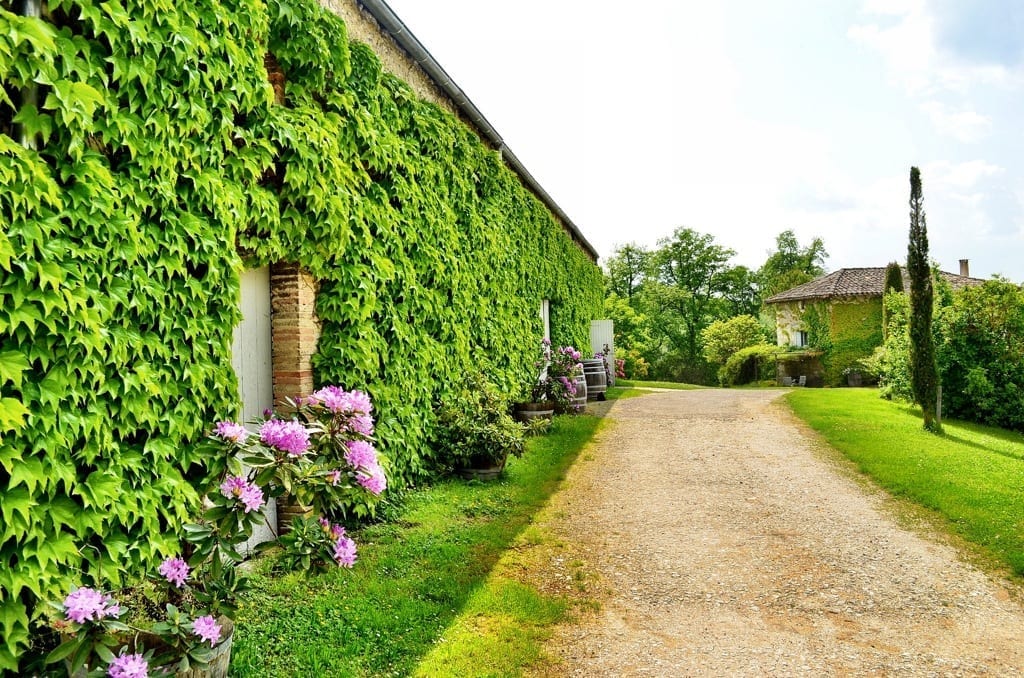I was already mesmerized by the perfect French countryside on the drive to Chateau de Mayragues. By perfect I mean that the hills dotted with red flowers and rustic barns seemed to have jumped out of a work by Monet. THIS was France, this was the postcard people think about, dream about, drool over, change their lives for. I was about to meet two such people, not the drooling sort, but the changing their lives kind.

The Chateau de Mayragues welcomes visitors, but not too many usually stop by which is why we had to rouse Mr. Alan Geddes from his study. I felt bad, but we were there after all to see his estate and more importantly taste his wines. He started speaking to us in French, which was fine, but then he looked at me and in a full Scottish brogue asked, “Are you American?” It was the beginning of a linguistically based friendship.
Alan and his wife Laurence moved to the Chateau with a dream of resuscitating the 14th century house and vineyards and in just fifteen years have transformed the entire estate. Even in the midst of a long and complicated restoration of the ancient estate, the family still managed to produce wines in their first year. True to the style of Gaillac winemaking, the varietals used aren’t entirely common and many were new to me.

Gaillac in the Tarn region surrounding Albi is the earliest wine-producing region in France, tracing their viticulture heritage back to the Romans. Mauzac, Len de L’El, Braucol and Duras grapes were all new to me, but are blended with more common grape varietals like Gamay and Cabernet Sauvignon to create a rich panoply of delicious wines. Alan isn’t only trying to be true to the region’s history, he’s found evidence that his own property has been the site of winemaking since the Roman times; an incredible lineage of viticulture through the ages.
Alan doesn’t just produce wine normal for the region, he produces the wines in a way different from almost all of his neighbors. Chateau de Mayragues subscribes to the slightly unusual agricultural practice known as biodynamics.
Simply put, biodynamics is a method of organic farming that emphasizes the holistic development and interrelationships of the soil, plants and animals as a self-sustaining system. One of the first modern ecological farming systems, it emphasizes a sustainable approach to agriculture. So lest you think Mr. Geddes and his wife are trying to be trendy, they aren’t. They’ve always taken this approach to their vineyards and are true believers in the results. I was looking forward to tasting the results myself as Alan opened the barn doors to reveal a tasting room.


I quickly decided that whatever they do at the winery, it works. The wines were delicate when they had to be and hearty and robust in all the right places. Mr. Geddes led us through the full line of his wines, tasting along with us, until we reached a special bottle at the end. It was unusual looking but because it had the St. Andrew’s Cross, the Scottish flag, I knew it had to be good. Alan couldn’t go completely French after all, he brought a little bit of home with him through the creation of a tasty eau de vie de vin. I saw variations of this throughout France, the eau de vie is essentially a double distilled spirit, not unlike brandy.
I’m not usually a hard spirits drinker, but I obligingly took a sip and was surprised at how smooth it was. Instantly a full range of flavors and aromas erupted and I could almost taste the land and water around us. It was a very natural drink, one that spoke to the countryside and the winemaker.


After the tasting and some good-natured chit chat about local news and events, Alan decided to take us on a short tour of his property. Just as the countryside surrounding the estate was a French postcard, so was his house. It just looked like what a classic French country house should look like. Working with area contractors and craftsmen, Alan and Laurence have brought back the look and spirit of a medieval chateau, with some modern improvements of course. Towards the back of the house were two spacious rooms that Alan said they rent out to interested people. I would never have guessed that the house was also a B&B, and I couldn’t think of a more relaxed pastoral setting to relax than on his estate.
After the tour, and some lemonade and cookies from Madame Geddes, we bid our adieus and climbed back into the car for the short drive to Albi, the destination for the evening. The stop hadn’t been scheduled, but I was thankful for the detour. Seeing the sights in cities and villages is great, I love it, but it was only when I got to meet some of the people working hard every day to contribute to the rich fabric of French life that I felt like I began, just began, to understand why the French are so deservedly proud of their country and culture.

